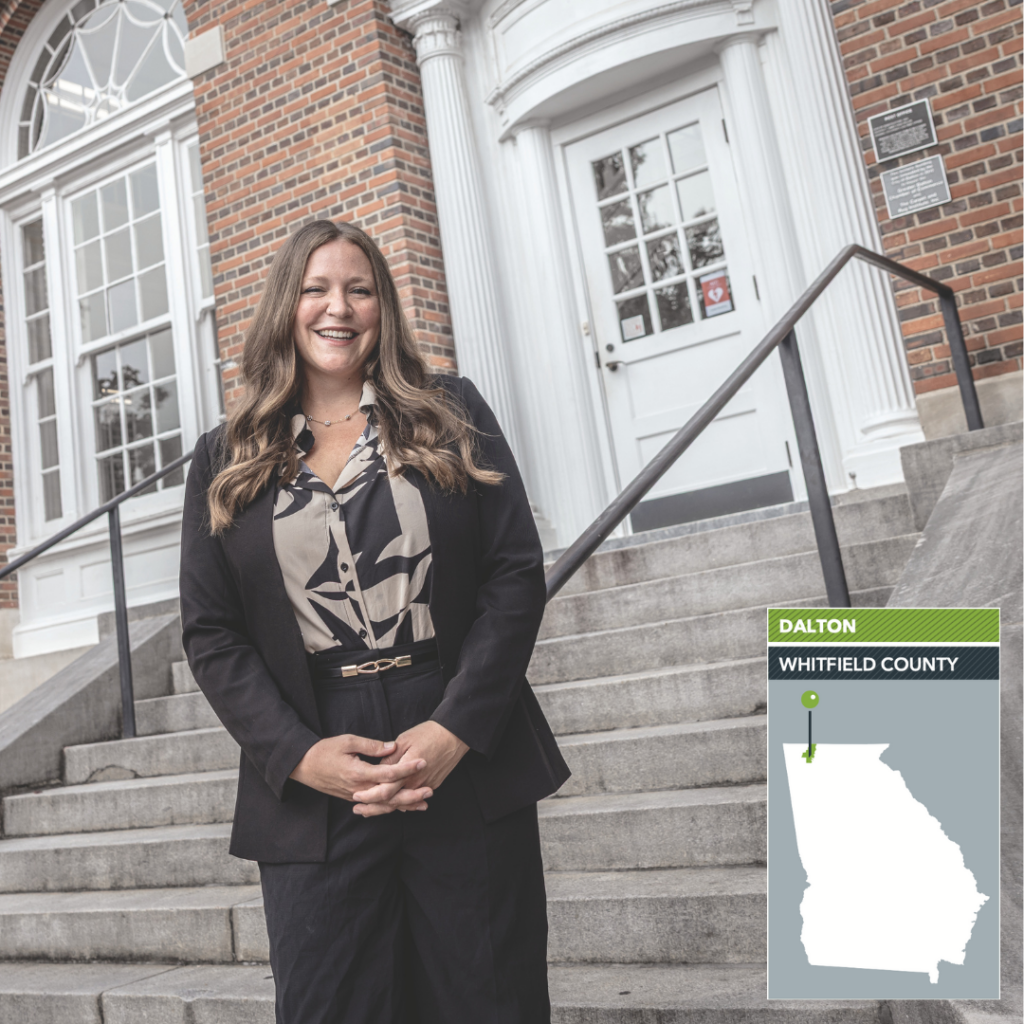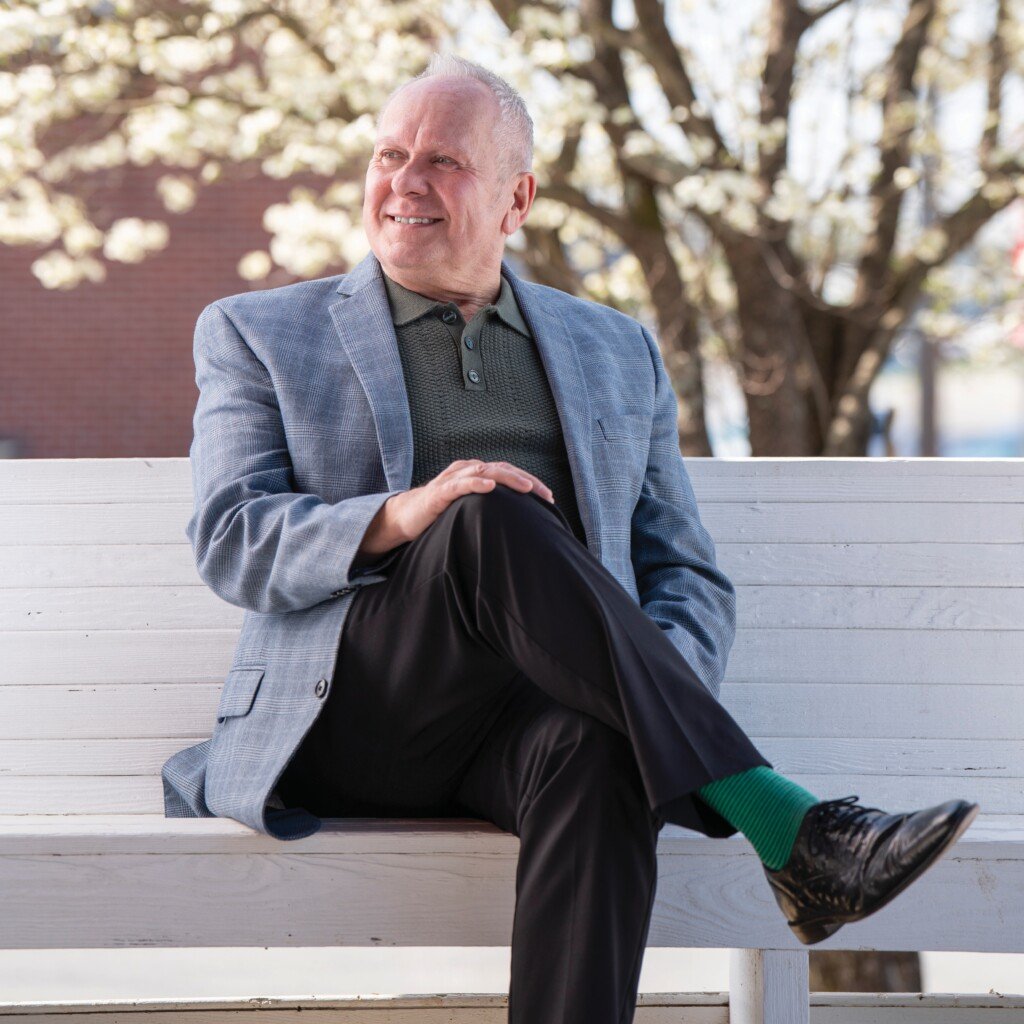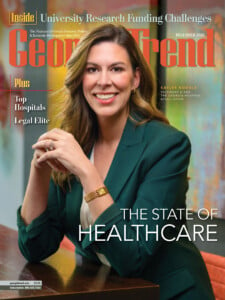Dalton | Whitfield County: Small-Town Vibe with Global Ties
Workforce, Healthcare, Growth
Dalton is a city where tradition, diversity and innovation live side by side. Known as the Flooring Capital of the World and affectionately celebrated by locals as SoccerTown USA, the city – which is 53% Hispanic – is home to billion-dollar data centers, award-winning healthcare and a growing college that is helping shape the next generation of Georgia’s workforce.
“Dalton is the perfect mix of rural and urban,” says Stephani Womack, chief operating officer and chief talent officer at the Greater Dalton Chamber of Commerce. “There’s a lot to do here – whether you want outdoor recreation like hiking and biking, a vibrant downtown experience or the ability to enjoy space and quiet without giving up city conveniences.”
That balance between small-town spirit and global reach has been central to Dalton’s transformation over the past decade. From the early days of carpet mills and family-owned flooring companies to today’s diversified economy that includes healthcare, tourism, higher education and advanced technology, Dalton and Whitfield County have become a case study in resilience and reinvention. The story of Dalton is one of people coming together – business leaders, educators, elected officials, philanthropists and residents – to write the next chapter of prosperity for Northwest Georgia.
Gathering Together

Hub of Connection: People gather at Burr Performing Arts Park to hear live music, as part of the Off the Rails concert series. Photo credit: Contributed
Few things capture Dalton’s character better than the way it gathers as a community. One of the most beloved traditions is the “Off the Rails” summer concert series, which transforms a downtown park into a hub of live music, food and connection every Friday night from June through September. Families spread out on blankets in Burr Performing Arts Park, children slide down the hills on cardboard, and neighbors stroll from breweries and restaurants with drinks in hand, thanks to open-container privileges. Over the course of the summer, thousands of people attend.
“It’s a picture-perfect Friday night in a small town,” says Womack. “The sense of community is incredible.”
Such events keep Dalton rooted even as the city modernizes. They also send a signal to industries and newcomers that Dalton is a community where people enjoy each other – a quality that has become a competitive advantage in today’s economy.
The Workforce of Tomorrow
Dalton’s future hinges on its ability to grow and retain a skilled workforce. For decades, flooring provided a steady pipeline of manufacturing jobs. Today, with the economy diversifying, Dalton has doubled down on workforce development, ensuring that talent is ready for everything from solar facilities and data centers to advanced healthcare.
The Chamber of Commerce has built partnerships with Dalton Public Schools, Whitfield County Schools, Dalton State College and Georgia Northwestern Technical College. Students learn about career options as early as high school through tours, industry speakers and networking events. Employers visit campuses, breaking down barriers between classrooms and workplaces.

Standout Initiative: Project Purpose is a 10-day career readiness program for graduating high school seniors who are not pursuing college. Photo credit: Contributed
One standout initiative is Project Purpose, a 10-day career readiness program for graduating seniors who are not pursuing college. The curriculum covers soft skills, workplace safety, financial literacy and interviewing techniques. At the end, students meet with employers for job opportunities. Since its launch in 2023, 54 students have completed the program and 45 have accepted full-time jobs – most are still employed with their original companies.
“It’s become one of the most effective workforce programs in our region,” says Womack. “It ensures that even if a student doesn’t choose college, they still have a strong pathway to success here in Dalton.”
Dalton State and Georgia Northwestern Technical College play equally vital roles. Faculty have designed programs in logistics, supply chain management, engineering technology and healthcare in close collaboration with local employers, ensuring students graduate ready to work on industry-standard equipment. Nursing and education programs, backed by state funding and local demand, are expanding to meet critical workforce needs.
Healthcare as an Economic Anchor
While flooring put Dalton on the map, healthcare is also big business. Vitruvian Health, which owns Hamilton Medical Center, aims to be an engine for economic growth, innovation and workforce training.
“Our key focus is improving and increasing access to care for our community,” Hamilton Medical Center’s President and CEO Sandy McKenzie explains. “That means not just at the hospital, but throughout the region.” Today, Vitruvian operates a wide network of physician practices, urgent care centers, imaging facilities, physical therapy clinics and specialty services across Whitfield, Murray, Gordon and Catoosa counties.
In 2021, Hamilton Medical Center began performing open-heart surgery. Since then, it has added advanced valve replacements, stent procedures, electrophysiology and AI-driven imaging tools that allow doctors to evaluate blood flow without invasive catheterizations. It was also first in the area to remove a blood clot using the ClotTriever XL system. The hospital earned a Platinum Performance Achievement Award from the Chest Pain – MI Registry.

Improving Access to Care: Hamilton Medical Center’s President and CEO, Sandy McKenzie. Photo credit: Kevin Garrett
“Patients no longer have to leave Dalton for world-class heart care,” says McKenzie.
Hamilton has also expanded cancer and neuroscience services. The hospital recently deployed the groundbreaking ION robotic navigation bronchoscopy system, allowing early detection of lung cancer.
Infusion therapies for Alzheimer’s and dementia patients have begun as well, making Dalton one of the few communities nationwide offering innovative treatments locally.
The medical center is also a teaching hospital. Residency programs in internal medicine and family medicine launched in 2020 and 2021, directly expanding the community’s physician workforce, with some of the graduates remaining at Hamilton. “Workforce development is critical in every industry,” McKenzie says. “For us, it means training the doctors who will care for this community for decades to come.”
The medical center has also addressed housing needs. By leasing land to a developer, Hamilton was a partner in apartments completed in 2024 adjacent to its campus, providing convenient housing for people who work there. The hospital has preferred leasing status for the units. It’s an example of how healthcare, workforce and community development intersect in Dalton.
Community initiatives amplify that impact. In June, Hamilton Sports Medicine, a program at the medical center, provided four days of free sports physicals to local middle and high school athletes.
Vitruvian’s Anna Shaw Children’s Institute hosts the 10th annual North Georgia Autism Conference this month. It’s intended for parents, educators, healthcare professionals and young adults on the autism spectrum.
The community also supports healthcare for those who can’t afford it. The DEO Clinic, which began as a program to help people who are homeless, is an independent nonprofit staffed by more than 60 medical and non-medical volunteers and four part-time staff members, providing care for uninsured patients. The Whitfield County health department also offers a number of services, including examinations for pregnant women, as well as lab work, nutritional counseling and education.
Turning Plans into Action

Community Pride: Anna Adamson, interim executive director of Believe Greater Dalton and executive director of Flooring Capital Development Corporation, at The Carpentry hotel. Photo credit: Kevin Garrett
One of the most important drivers of Dalton’s transformation has been Believe Greater Dalton, a community initiative launched in 2018 by the Greater Dalton Chamber of Commerce. Built on surveys, focus groups and consultant data, the initiative identified key strategies: education, entrepreneurship, housing, economic development, downtown and community pride.
“Those studies don’t just sit on a shelf,” says Interim Executive Director Anna Adamson, who is also the executive director of Flooring Capital Development Corporation. “They’ve been leveraged to bring real dollars and real projects into our community.”
Housing offers the clearest example. Dalton had not seen a new multifamily development since 2001. Since the 2018 housing study, about 900 multifamily units have come online, most of which are market-rate apartments.
The Georgia Department of Community Affairs awarded a $1.5 million grant to the Dalton-Whitfield County Joint Development Authority to fund infrastructure for 40 workforce homes. Construction is underway with homes expected to be available in the next two years.
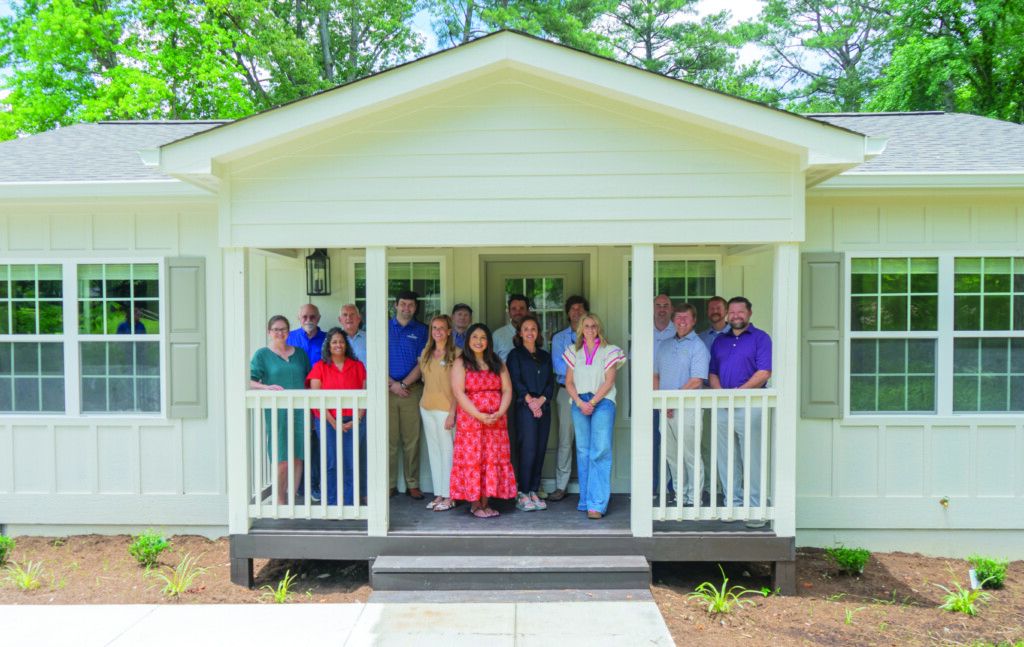
Energy Efficient: A pilot program supported by Truist Charitable Fund, Believe Greater Dalton, the Dalton Housing Authority, Engineered Floors and North Carolina-based SIPLok, allowed builders in Chatsworth to use Eco-Panels technology in their construction. Photo credit: Contributed
A $100,000 Truist Charitable Fund grant supported a pilot program introducing energy-efficient Eco-Panels technology to local builders.
Revitalization followed a similar pattern. Recommendations from the 2018 downtown master plan unlocked a $2.2 million state grant for the Cuyler-Pentz streetscape project, supporting a corridor now bustling with shops, restaurants and a boutique hotel, The Carpentry.

Engagement and Unity: Believe Greater Dalton has helped launch small business workshops on topics like AI and marketing. Photo credit: Contributed
The 2023 update to Believe Greater Dalton added engagement and unity as strategic pillars. That has led to HOLA, the Hispanic Leaders Association, which brings young Hispanic leaders into civic conversations. The group has connected with Dalton State’s president, launched small business workshops on AI and marketing, and is working to ensure they represent Dalton’s large Latino community in decision-making.
Looking ahead, Adamson says the focus will be on making Dalton not just a place to work, but a place to live and invest. With 30,000 commuters driving into Dalton daily, housing and community amenities are critical. A new marketing campaign and community-led master plan for the urban core are in development.
“We want to be strategic about how Dalton grows,” Adamson says. “The work we’re doing today – whether in housing, revitalization or engagement – sets the foundation for a community that people want to call home.”
Tourism on the Rise
Tourism is heating up in Dalton and Whitfield County. Margaret Thigpen, director of tourism for the Dalton-Whitfield Convention and Visitors Bureau, says the numbers tell the story: $12 million in economic impact last year, with $9.5 million generated by July this year – on pace to set a new record.

Tremendous Growth: Margaret Thigpen, director of tourism for the Dalton-Whitfield Convention and Visitors Bureau. Photo credit: Contributed
“Since COVID, we’ve seen tremendous growth,” Thigpen says. “We’ve even been able to pull events from larger communities like Chattanooga and Atlanta.”
Dalton’s advantage is clear: more than 1,000 hotel rooms, 143,000 square feet of convention space, and a wide range of athletic fields and recreation facilities. Located directly off Interstate 75, Dalton is easy to reach and easy to navigate. “You don’t pay for parking here,” Thigpen says, noting that cost and convenience are major selling points.
Sports tourism is the backbone, drawing families and athletes for tournaments. But Thigpen says meetings and conventions are also on the rise, as groups shift away from larger cities for reasons of cost, safety and logistics. “Once groups give us a chance, they find they don’t want to look anywhere else,” she says.
Cultural attractions in the county round out the picture. The Western & Atlantic Railroad Tunnel and Clisby Austin House, both in Tunnel Hill, draw history buffs, while the Bandy Heritage Center for Northwest Georgia tells the story of Dalton’s textile legacy and contains artifacts, documents and audiovisual media reflecting the lives and activities of people in Northwest Georgia. Rocky Face Ridge Park blends hiking, biking and Civil War history. At 1,000 acres, it’s one of the largest county-managed parks in Georgia.

Popular Festival: The Prater’s Mill County Fair attracts about 8,000 visitors a year. Photo credit: Contributed
Festivals bring in thousands: The Prater’s Mill Country Fair, which takes place this month, attracts about 8,000 visitors annually. The Dalton Civitan Music Festival, held each year in May, brings in hundreds of music fans and the Off the Rails concerts draw about 1,700 people per week.
“What makes Dalton special is the total package,” Thigpen says. “Visitors come once, and they want to come back.”
Dalton State: Vision 2050
Higher education is also part of Dalton’s transformation. At Dalton State College, momentum is building around Vision 2050, a 25-year strategic plan launched by President John Fuchko last November. Its theme – transforming lives and partnering for success – frames three priorities: next-generation education, unparalleled student experience and strategic partnerships.

Positive Student Experience: John Fuchko, president of Dalton State College. Photo credit: Kevin Garrett
The results are already visible. Enrollment has topped 5,100 this fall, up 4.7% from last year and the third consecutive year of growth – bucking national trends of declining enrollment. About half of the students in this year’s freshman class are the first in their families to attend college.
In-state tuition remains around $2,000 per semester, making Dalton State one of the most affordable colleges in the country. The Wall Street Journal/College Pulse 2024 Best Colleges ranked Dalton State No. 1 in the nation for student experience. In 2025, it was recognized among the top 10% of colleges for student experience nationwide.

Very Intentional: Kate Maine, Dalton State College’s vice president for marketing, communications and workforce development. Photo credit: Contributed
“We’re being very intentional about what Dalton State needs to be for our students and for Northwest Georgia over the next quarter century,” says Kate Maine, Dalton State’s vice president for marketing, communications and workforce development.
Dalton State was the first public school in Georgia to be designated a Hispanic-Serving Institution, with Latino students comprising 38% of enrollment. The designation makes it eligible for additional grants that fund wraparound services for all students.
Academically, Dalton State remains closely tied to industry needs. Engineering technology, developed with flooring manufacturers, prepares graduates for high-demand careers. Nursing and education programs are expanding, with selective master’s degrees in development. The college also plans to grow experiential learning opportunities to more than 1,200 placements, from internships to clinicals and research projects. Such expansions have far-reaching effects for students who previously might have not been interested in attending college.
“The University System of Georgia reports that bachelor’s graduates earn an average of $1.4 million more over their lifetimes than those without a degree,” Maine says.

Expanding Program: Dalton State College accepts more than 100 nursing students each year. Photo credit: Contributed
County Leadership: Building for the Future
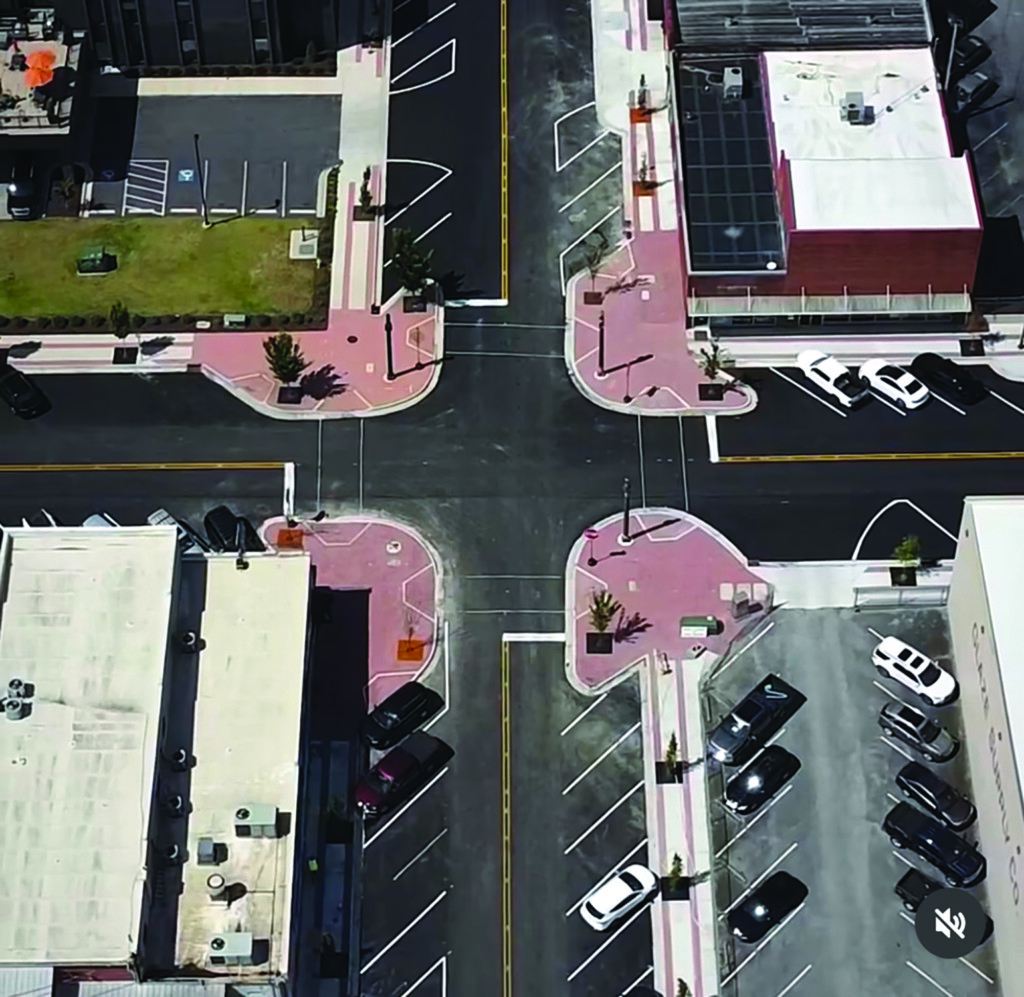
Master Plan: The Cuyler-Pentz streetscape project was paid for by a $2.2 million state grant. Photo credit: Contributed
At the county level, infrastructure and industry diversification are top priorities. Whitfield County Commission Chair Jevin Jensen points to the construction of a new community center at Westside Park, which will feature an indoor walking track, two gyms, a community center and a playground. It will complete what Jensen calls the county’s “crown jewels” of recreation, alongside baseball, softball, soccer and Miracle Field, which is designated for the Miracle League of Whitfield County, for children with disabilities.
Public works have also accelerated. The county now paves around 30 miles of road each year, roughly triple the amount paved annually before 2021. Bridge remediation projects are nearly complete, ensuring compliance with modern safety standards. A reconstruction project on Carbondale Road included the installation of roundabouts, the first in unincorporated Whitfield, providing a continuous flow of traffic for cars entering or exiting I-75.
Industry diversification is reshaping the county’s economy. While flooring remains strong, new sectors are taking root. Core Scientific and CleanSpark are investing in local data centers – two of them with potential to expand. Although they employ relatively few workers, most jobs pay well.

Drawing Visitors: History buffs and families enjoy the Western & Atlantic Railroad Tunnel in Tunnel Hill. Photo credit: Contributed
“Years ago, four out of our top five employers were flooring,” Jensen says. “Today it’s two out of five. That makes our economy stronger and more resilient.”
Carbondale Industrial Park is nearly full, thanks to expansions by Qcells and Essentia Protein Solutions, and leaders are eyeing future sites for large employers outside of flooring.
“We know how to make things,” Jensen says. “Whether it’s flooring, solar panels or information in a data center, we’re building an economy that’s resilient for the next 20 to 30 years.”
From Friday night concerts downtown to billion-dollar investments in data centers, Dalton and Whitfield County embody the art of balance – between heritage and innovation, warmth and ambition. Leaders point to collaboration as the community’s greatest strength: between city and county, business and education, healthcare and housing, philanthropy and industry.

Resilient Economy: Whitfield County Commission Chair Jevin Jensen at Miracle Field, which is designated for the Miracle League of Whitfield County, for children with disabilities. Photo credit: Kevin Garrett
The story of Dalton is one of resilience, creativity and connection. It is a place where small-town spirit meets global industry and where the future looks brighter with each step forward.
Local Flavor
Giving Thanks Together

Beloved Tradition: Nearly 2,000 people gather on the Monday before Thanksgiving for Gratefull Dalton, a free holiday feast with food donated from local restaurants and community members. Photo credit: Contributed
On the Monday before Thanksgiving, downtown Dalton closes a block of road, sets up a long table through the heart of downtown, and nearly 2,000 people from all walks of life come together for one purpose: to share a meal.
This is Gratefull Dalton, the community-wide Thanksgiving lunch that has become a beloved tradition.
The idea emerged after Dalton volunteers visited Gratefull Chattanooga in 2018. Inspired by the event started by the nonprofit Causeway, they returned with a replication guide, determined to make it happen locally. In 2019, Gratefull Dalton was born, welcoming more than 1,400 people to its first feast.
The pandemic forced a pivot in 2020 and 2021, when the event became a food drive in partnership with the Chattanooga Area Food Bank. But in 2022, the long table returned, and the celebration hasn’t stopped growing since. In 2024, organizers estimate more than 1,800 guests gathered. For 2025, they’re planning for 2,000.
Unlike a soup kitchen, Gratefull Dalton is a festive, come-one-come-all community table. Twenty or more restaurants either donate or provide food at cost. The menu reflects both Dalton’s Thanksgiving traditions and its diversity: turkey and dressing from Oakwood Café, tamales and Mexican bread from local families, rice and beans from Dos Bros. Sweet potato pies, casseroles and international flavors all find a place on the table.
“No matter who you are, you’ll find something that feels like home,” says Stephani Womack, Gratefull Dalton planner.
A grand piano sits in the street, and community members play holiday music throughout the day. Last year, Santa joined the fun, posing for photos with children while the library hosted story time, crafts and a book giveaway. A gratitude wall invites guests to write why they’re thankful.
There is no agenda – just neighbors arriving as strangers and leaving as family. Business leaders take lunch breaks at the same table as families in need. “It’s regarded as one of the favorite days of the year in Dalton,” Womack notes.
The event is organized through Believe Greater Dalton, an arm of the Greater Dalton Chamber of Commerce, and supported by chamber investors. Around 250 volunteers make it possible, from setting up tables to serving. And while donations of canned goods are requested for the food bank, anyone and everyone can eat.
As this year’s celebration nears, one thing is clear: Gratefull Dalton is a reflection of a community that knows the true meaning of Thanksgiving.


